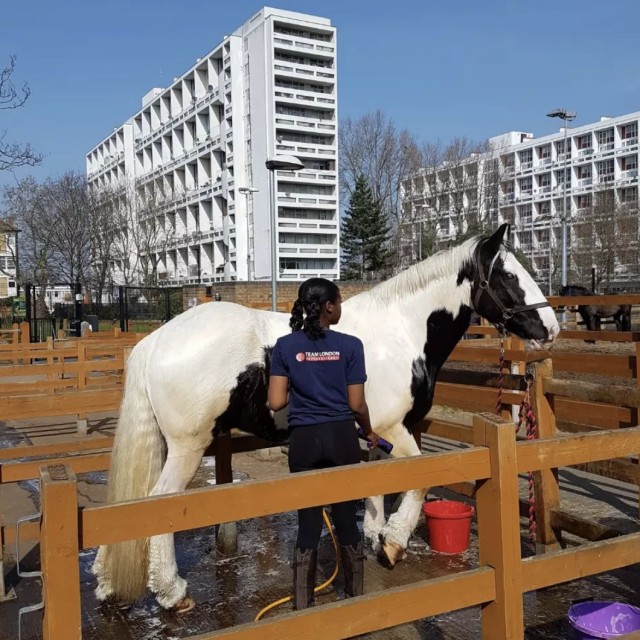
Ebony Horse Club: You Belong Where You Want to Be
“Bringing the equine world into the city, instead of bringing the people into the equine world, made it accessible to a whole new audience. Some participants even go on to find jobs and careers in an industry that was previously inaccessible.”

Ebony’s center has become a place for participants to thrive both in and out of the saddle. Picture from Ebony Horse Club’s Instagram.
Ebony Horse Club is not your typical riding stable, located on a farm in a rural community. Instead, Ebony Horse Club is a charity based in Brixton in South London — far from where horses are found typically. I called Naomi Howgate, Ebony’s General Manager, to learn more about the charity, what it offers, and how the larger equine industry can support its mission.
Despite its unique location, Ebony offers equestrian activities (mounted and unmounted) to provide new opportunities to riders who would otherwise have limited interactions with horses. Through its work with horses, Ebony aims to develop life skills, raise aspirations, and provide new opportunities to participants.
Ebony was founded over 25 years ago when there was a clear lack of opportunity for people living within cities to interact with horses. Beginning as road trips to the country with a few kids, Ebony quickly developed interest, requiring more fundraising and organization to continue with the programming.
These field trips continued to be, and still are, part of Ebony’s services. However, in an effort to expand access to a greater number of riders in a more convenient location, a stable was built in London in 2011 to act as a center for the charity.
At this center, there is now a youth classroom, offices, stalls for nine horses, a small paddock, and a ring. Participants have access to riding lessons (mounted and unmounted), demos, introductions to new disciplines and pathways, youth work sessions (such as learning about healthy eating or just enjoying a movie night), and the continuation of trips off of the center site to be introduced to other opportunities.
Introducing students to a variety of horse and non-horse related paths is key to Ebony’s work. Through introducing these new options, Naomi stressed Ebony wants to make it clear to participants that “[they] belong where [they] want to be”.

Access to horses can be challenging in a city. Ebony works to increase access to equestrian opportunities, so any young person can find success as an equestrian. Picture from Ebony Horse Club’s Instagram.
With their center, Ebony can now serve 150 kids per week. These riders are from the local Brixton community and often face challenges such as coming from low income areas, being excluded at school, violence, or poverty. To assist in serving so many riders from such a variety of backgrounds, eight staff members are assisted by a huge team of volunteers who help with the barn work, lessons, and trips. Additionally, other community groups in the area collaborate and support one another by participating in activity exchanges, and supporters help develop the organization by showcasing Ebony’s work, and supporting in funding.
Ebony has been successful in introducing new participants to horses. However, the mission and success of Ebony is so much broader than that. Ebony wants to see riders “thrive both in and out of the saddle.” Due to this, success for Ebony is defined by the success of the young people involved. Do they feel supported, happy, and healthy? Are they thriving? Providing a safe space for people to be and connect with new friends in a community affected by youth violence, gangs, and poverty allows participants to see a sport (and a whole horsey world!) that would not otherwise be on their radar. Bringing the equine world into the city, instead of bringing the people into the equine world, made it accessible to a whole new audience. Some participants even go on to find jobs and careers in an industry that was previously inaccessible.
While Ebony has enjoyed success for their participants and community, it does not come without challenges. Meeting the demand for services can be difficult: “We’re limited by our space. Our number of horses impacts the number of lessons we can teach,” Naomi stresses. To accommodate for the increasing demand, Ebony is expanding to allow for more youth work to take place, serving a larger number of students, and possibly new communities. Of course with expansion comes the need for fundraising too, which seems to be never ending.
View this post on Instagram
Despite these challenges and the evolution of the charity, Naomi emphasized the large and important role that the larger equine industry plays in the success of the charity. Professional riders willing to dedicate their time to connect with Ebony’s participants, provide clinics or training videos, and highlight the career paths in the industry assists in connecting the lessons learned at Ebony to real world circumstances.
Ebony is proof that you can do things differently and still be successful — you don’t need endless acres, massive amounts of money, or a horsey family to “make it” in the horse world. “Any young person can go out there and be a great rider, be a success,” Naomi says.
The larger equine industry can support Ebony Horse Club, and other charities working to expand equine access, by “being open minded to the mission, support and champion the ‘underdog’ riders, assist in fundraising efforts, or creating work experience opportunities for participants.” We all have the ability to promote and develop our sport to be increasingly open minded, creative, and accessible, reminding all riders that “[they] belong where [they] want to be”.
Ebony Horse Club will be taking over Horse Nation’s Instagram, @go_riding, later this month for a behind-the-scenes look at the work they do and the community they build. Be sure to tune in!




